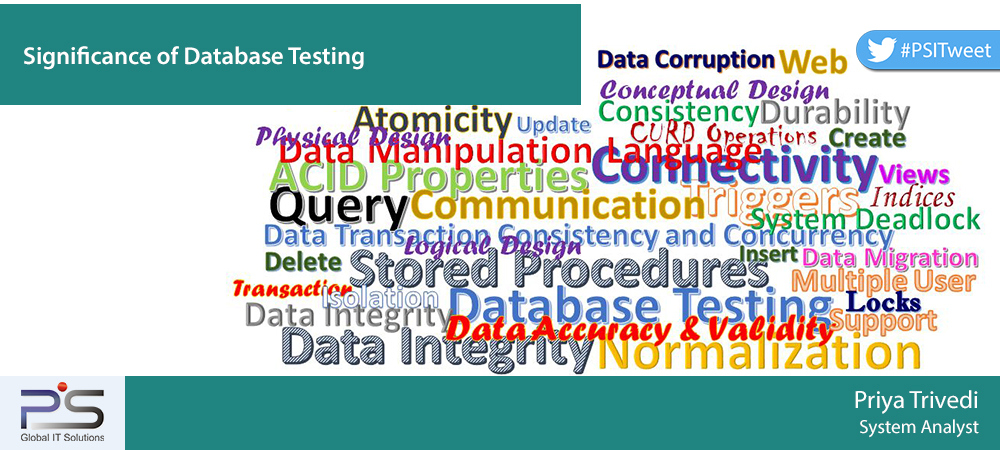Database is a valuable asset for each and every company in today’s technology world. It is crucial and acts as the backbone of any software application. Without an appropriate database, we cannot imagine the application systems to function as per user requirements.
Initially the banks were using manual processes to record the different transactions, but the technology help in streamlining their processes. The software applications are regularly updated to provide better functional benefits and convenience to bank. What happens if while migrating from one application to another the underlined database is not transferred properly? The transactions will all get messed up and the basic use of technology gets defeated. So we need to test our database for all related attributes.
The organizations generally utilize different applications having the same database concurrently. These applications need to be upgraded regularly as per latest market requirements. We have to migrate the database carefully between the different applications. It is important to have a good database management system due to high relevance of database and data consistency.
In general, an application development includes programming code, configuration files, CSS Files, JQuery files, third party tools, SQL files, and other external systems. On the other hand, testing an application means testing each and every part separately and also testing how all these parts communicate within themselves and with external factors.
Traditionally, the data related testing is done at the GUI/Client Layer or Business Logic Layer. Apart from testing the various codes and attributes, testers would also need to test the vital part in the system-the database.
Database testing is a process of testing the data stored in the database. It requires some in depth knowledge of the given application and a pre-planned approach to test the data. It is essential when application has persistent storage of data, have centralized control over data, control on data redundancy, control on consistency and integrity, includes multiple user support, data sharing practice, data documentation, data autonomy, control over data access and moreover client is concerned for security, backup and recovery of data.
There are many database tools available like MS-Access2010, MS SQL Server 2008 r2, Oracle 10g/11g, Oracle Financial, MySQL, PostgreSQL, DB2 etc. The software applications must be developed using any of the database tools.
The question comes in mind that what we have to test in database testing. The main attributes to be considered in testing are:
- Accurate mapping of different screens of application and the relationship of its DB: For all CRUD operations, verify that respective tables and records are updated when user clicks ‘Save’, ‘Update’, ‘Search’ or ‘Delete’ from GUI of the application as per the design documents.
- Exhaustive testing of ACID properties of DB Transactions: ACID properties refer to the ‘Atomicity’, ‘Consistency’, ‘Isolation’ and ‘Durability’. Proper testing of these four properties must be done during the DB testing activity.
- Data integrity: Maintaining and assuring the accuracy and consistency of data over its entire life-cycle is a critical aspect to the design, implementation and usage of any system which stores, processes, or retrieves data.
- Implementation of Business Rules: The business rules describe the operations, definitions and constraints that apply to an organization and are put in place to help the organization achieve its goals and objectives.
In order to test the DB accurately, a tester should possess good knowledge of SQL and specially DML (Data Manipulation Language) statements. The tester should also acquire understanding of internal DB structure of AUT (Application under Test). Once these pre-requisites are satisfied, then the tester can test the DB with more accurate parameters.
Database is the engine of any client/server system. What if any malfunctions appear it may cause system deadlock, data corruption, data loss and bad performance. Hence, the importance of database testing in software testing should not be ignored.Database is a valuable asset for each and every company in today’s technology world. It is crucial and acts as the backbone of any software application. Without an appropriate database, we cannot imagine the application systems to function as per user requirements.
Initially the banks were using manual processes to record the different transactions, but the technology help in streamlining their processes. The software applications are regularly updated to provide better functional benefits and convenience to bank. What happens if while migrating from one application to another the underlined database is not transferred properly? The transactions will all get messed up and the basic use of technology gets defeated. So we need to test our database for all related attributes.
The organizations generally utilize different applications having the same database concurrently. These applications need to be upgraded regularly as per latest market requirements. We have to migrate the database carefully between the different applications. It is important to have a good database management system due to high relevance of database and data consistency.
In general, an application development includes programming code, configuration files, CSS Files, JQuery files, third party tools, SQL files, and other external systems. On the other hand, testing an application means testing each and every part separately and also testing how all these parts communicate within themselves and with external factors.
Traditionally, the data related testing is done at the GUI/Client Layer or Business Logic Layer. Apart from testing the various codes and attributes, testers would also need to test the vital part in the system-the database.
Database testing is a process of testing the data stored in the database. It requires some in depth knowledge of the given application and a pre-planned approach to test the data. It is essential when application has persistent storage of data, have centralized control over data, control on data redundancy, control on consistency and integrity, includes multiple user support, data sharing practice, data documentation, data autonomy, control over data access and moreover client is concerned for security, backup and recovery of data.
There are many database tools available like MS-Access2010, MS SQL Server 2008 r2, Oracle 10g/11g, Oracle Financial, MySQL, PostgreSQL, DB2 etc. The software applications must be developed using any of the database tools.
The question comes in mind that what we have to test in database testing. The main attributes to be considered in testing are:
- Accurate mapping of different screens of application and the relationship of its DB: For all CRUD operations, verify that respective tables and records are updated when user clicks ‘Save’, ‘Update’, ‘Search’ or ‘Delete’ from GUI of the application as per the design documents.
- Exhaustive testing of ACID properties of DB Transactions: ACID properties refer to the ‘Atomicity’, ‘Consistency’, ‘Isolation’ and ‘Durability’. Proper testing of these four properties must be done during the DB testing activity.
- Data integrity: Maintaining and assuring the accuracy and consistency of data over its entire life-cycle is a critical aspect to the design, implementation and usage of any system which stores, processes, or retrieves data.
- Implementation of Business Rules: The business rules describe the operations, definitions and constraints that apply to an organization and are put in place to help the organization achieve its goals and objectives.
In order to test the DB accurately, a tester should possess good knowledge of SQL and specially DML (Data Manipulation Language) statements. The tester should also acquire understanding of internal DB structure of AUT (Application under Test). Once these pre-requisites are satisfied, then the tester can test the DB with more accurate parameters.
Database is the engine of any client/server system. What if any malfunctions appear it may cause system deadlock, data corruption, data loss and bad performance. Hence, the importance of database testing in software testing should not be ignored.[:]









